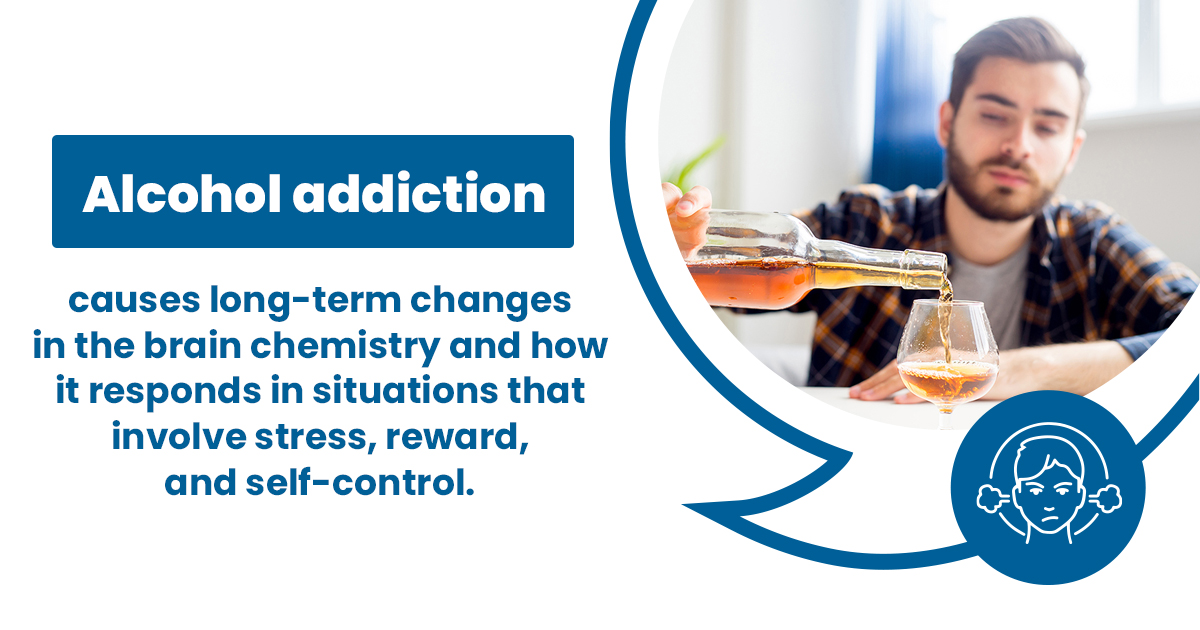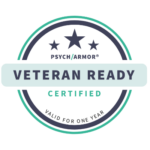
Alcohol addiction (or any addiction, for that matter) is a complex, chronic condition characterized by re-occurring substance abuse.
Addiction entails continuing drug and alcohol abuse, even when faced with harmful and long-term consequences.
Alcohol addiction causes long-term changes in the brain chemistry and how it responds in situations that involve stress, reward, and self-control. This, combined, makes it much more difficult to stop drug abuse.
If you or a loved one is going through addiction, it is time to choose a facility and help a loved one or yourself.
Consequences of Unchecked Addiction
Wide-ranging and complicated consequences of addiction might affect people differently.
However, addiction is still a treatable disorder similar to chronic medical conditions, including diabetes and hypertension.
According to multiple studies and research, plenty of effective treatments guarantee numerous positive outcomes that work to treat addiction.
One of the most effective treatments is residential treatment programs.
Here, clinicians apply the whole-person approach for accessing a person, and this is done to effectively determine the appropriate level of care and a customized patient treatment plan.
Haven Detox-South Florida Inpatient Treatment
At Haven Detox-South Florida, our state-of-the-art residential rehab facility offers comprehensive residential addiction treatment.
Treatment programs at our facility are run by professional medical staff members who cater to and curate research-backed alcohol treatment programs for patients suffering from varying forms of addiction and who need customized inpatient care.
Residential Drug Treatment
Addiction and co-occurring mental illnesses are multi-faceted diseases that cannot be fought alone; patients need a safe environment and constant medical advice to get through addiction.
Medical professionals at Haven Detox-South Florida offer treatment with a holistic approach for mental disorders and addiction.
The initial assessment approach at our facility constitutes a thorough initial checkup for clients and a complete mental health evaluation.
This check is essential as it evaluates the patients and monitors for any co-occurring conditions and the severity of triggers that cause stress and addiction.
The residential treatment offers 24-hour medical supervision and structured care, all within a non-hospital yet supportive environment.
Unlike outpatient treatment, people in inpatient or residential programs stay in the treatment facility and do not go home, to school, or work for the duration of their treatment.
The ideal residential treatment program has counseling and related behavioral health services.
Many residential treatment programs offer support for co-occurring mental health disorders, depending on the level of care and a patient’s needs.
Residential Treatment Program Participants
Residential treatment is for people who:
- Are suffering through recurring and consistent substance addiction
- Have chronic SUDs (substance use disorders)
- Suffering from co-occurring mental health disorders or/and other medical issues
- Do not need medically managed services or treatments.
Instances of the residential setting of treatment comprise of:
- Sober living homes
- Therapeutic communities
- Long-term residential treatment programs that last anywhere from six to twelve months
- Short-term residential treatment programs that last from three to six weeks
The constant round-the-clock medical supervision of the residential treatment offers a safe place for people to recover from addictions with total support from the staff and their peers.
The residential treatment centers offer a specific level of medical monitoring; however, it is not to the extent of a medically run and managed intensive inpatient treatment.
Haven Detox-South Florida offers help to understand and treat your addiction with varying treatment options.
Residential or Inpatient Treatments
Residential and inpatient treatment programs look similar; however, they differ in the levels of care.
Both programs target to play a substantial and essential role in a person’s recovery; however, there are some ways in which the inpatient and the residential treatment programs might differ, and these include:
Treatment Setting
Inpatient treatment is offered in a hospital or a specialized medical treatment facility.
On the other hand, residential treatment programs are run within a group living or a community home environment.
Medical Care and Management
Inpatient treatment provides constantly monitored and medically managed care focusing on stabilizing a patient.
The residential treatment primarily offers access to medical staff and clinical care without 24/7 monitoring to focus on continuing recovery.
Program Duration
Inpatient treatment is not considered a long-term form of care. Instead, it is an acute short-term care and treatment program.
The residential treatment can be open-ended and may last anywhere from a few months to a year.
The duration of stay also depends on a person and their progress in the program, which is determined by the medical team at the treatment facility.
Residential Care Levels
The level of residential care at Haven Detox-South Florida is designed to fulfill the different needs of patients while preparing the person to transition into a low level of care.
The continuum of care also allows for the treatment to be intensified when a person is not progressing with their current level of treatment.
For Admission to an appropriate level of care, a professional addiction treatment professional shall put you through a thorough assessment, which includes:
- Patient’s substance use history
- Patient physical health
- Emotional and mental health
- Drive towards change
- History of relapse
- Living situation
- Support system and structure
ASAM American Society of Addiction Medicine has put forward five levels of care, residential care to be exact, and these include:
- Initial intervention
- Outpatient services
- Partial hospitalization /Intensive outpatient services
- Inpatient and residential services
- Intensive inpatient services that are managed medically
Services at Residential Rehabilitation
Types of services offered and their settings might vary.
Individualized care enables the treatment to be customized to meet a person’s specific and unique needs. These individual needs and the care program settings take into account the substance being used and emotional, social, legal, and psychiatric factors.
Customized care also includes treatments that serve specialized groups of people, including:
- Teenagers
- Veterans
- LGBTQIA+
- Men and Women
- People suffering from co-occurring disorders
- Unhoused population
The residential treatment programs provide an array of services that, when combined, help address the effects of substance use disorder. While also expanding a patient’s ability to function appropriately in their daily lives.
Services include:
Medical Detoxification
The clinically designed detox program in a residential facility offers around-the-clock supervision that revolves around peer and social support.
If patients require intensive medical care and support, they might find an inpatient or detox treatment facility better suited to their needs.
Behavioral Therapy
Primarily managed in a group or individual setting helps people learn healthier coping skills, develop positive pastimes/hobbies, and manage stress better.
The counseling sessions take place in individual and group settings; these include family therapy, CBT – cognitive behavioral therapy, or other varying therapeutic practices.
Medication-Assisted Treatment (MAT)
It includes using medications and other traditional therapies to help people recover.
Support Groups
Patients here are mainly urged, encouraged, and sometimes necessitated to attend the support groups and their meetings while under treatment.
Doing so allows patients to connect with others (members) and build a strong support network.
This results in a comparatively easier transition to daily life once treatment is complete.
Duration of Stay in Residential Treatment
The time a person spends in residential drug treatment programs fluctuates, and it is dependent on multiple factors, these include:
- Level of care determined by the medical staff
- A patient’s medical, psychological and physical needs
- The substances being abused
- The severity of a person’s substance use disorder
- Preceding attempts to seek treatment
- Co-occurring mental health disorders
- Detox issues
- Any legal issues
Studies show that while a longer duration of treatment might deliver improved outcomes, any length can be beneficial.
Attending an alcohol and drug residential treatment program can help a person effectively abstain from substance abuse while also working to gain the necessary skills to lead a productive, healthy, and fulfilling life free from compulsive substance use.
Choosing a Residential Treatment Program
A person admitted to residential drug treatment programs needs an amplified level of supervision and a basic structure.
These things are not in the scope of outpatient care or programs.
Similarly, people might not show the need for a medical focus, or constant monitoring, which are the basic characteristics of most intensive inpatient programs.
At the same time, they may demonstrate that they don’t need the medical focus and constant monitoring that characterizes many intensive inpatient programs.
Patients who seek Admission to residential programs are mostly going through acute substance use problems or mental health disorders that necessitate a 24 hours care.
Residential treatment can also be recommended after a patient completes treatment. This is done to offer support for maintaining sobriety while living independently.
When picking out a residential treatment program, there are many factors to consider.
These factors are essential to determine the kind of support a person needs for successful and long-lasting recovery.
Taking the time to learn and read about the program and getting in touch with the treatment facility shall help patients make appropriate treatment choices.
Some important factors include the following:
Accreditations
Check to verify if the facility you choose is accredited by the joint commission of the United States, which is the torch bearer for promoting quality health care and human service providers.
Staffing Credentials
Read up on the staff credentials, along with whether or not the facility offers medical supervision.
Treatment Methodology
Make sure that the facility you choose provides a treatment that perfectly aligns with your required level of care.
Cost
The cost of residential drug treatment varies depending on multiple factors, and these include:
- Atmosphere and amenities offered at the treatment facility
- Qualified treatment team
- Tools and services for treatment
- Type of treatment
You might also be able to find low-cost, free or state-funded rehab options. Always check to verify whether or not the facility accepts your insurance plan or if they offer scholarships or financing options.
Amenities, Facilities, and Services
Facilities and amenities differ, mainly depending on the treatment facility and the program you are attending.
However, most treatment facilities come with:
- Private rooms
- Pool access
- In-house chef-prepared meals
- Massage parlors (specifically for massage therapy), and more.
Note: Luxury facilities and their amenities impact overall treatment programs’ costs.
Specific Populations
Some residential treatment programs center around specific populations, and those include:
- Men and Women
- LGBTQIA+
- Teens and Adolescents
- Veterans
- Unhoused people
Site and Location
Some people prefer to seek treatment closer to their homes, while others prefer a program farther away from their homes/work or institutes.
It is also advised to check the visitation policies and see if the facility allows regular visitation.
Frequently Asked Questions (FAQ)
What is the best treatment system for addiction?
Inpatient treatment programs that offer behavioral therapies and counseling are the most common and widely used successful forms of treatment.
Plus, medication is also an essential part of addiction treatment, specifically when combined with behavioral therapies.
What do you wear to residential treatment?
Your attire must not be revealing, and the shoes should be comfortable enough to go on outings and walks.
You might not need to pack clothing for 30 to 60 days, even when it comes to inpatient treatment programs, as there are washer and dryer facilities for use.
Only a change of 8 to 10 outfits is recommended, with pieces you can mix and match.
What is the best treatment for substance abuse in older adults?
The most ideal and recommended treatment approaches for adults include:
Family therapy
Group therapy
Cognitive behavioral approaches
Residential Drug Treatment Programs for Recovery at Haven Detox-South Florida
Multiple factors must be considered if you are looking for residential drug treatment programs.
Detox programs, SMART recovery, and the thorough residential treatment programs at the Haven Detox-South Florida are best suited for treating alcohol addiction and co-occurring mental health issues.
Our state-of-the-art facility and treatment programs are easily accessible to varying populations, including veterans.
At the Haven Detox, we offer the convenience of working with many insurance companies that cover our addiction and mental health treatments.
Prepare for Admission and start your journey to recovery today.
Get in touch with us at (561) 328-8627.






